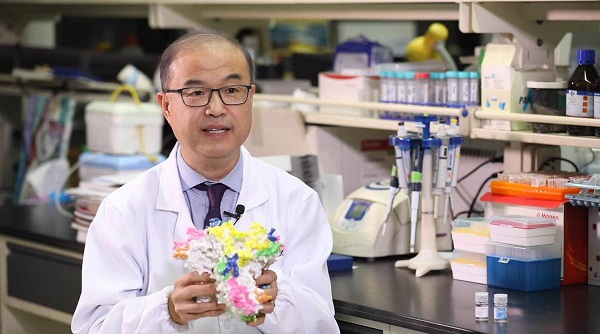

Zhang Linqi, leading scientist in developing China's first approved COVID-19 antibody drug, demonstrates a model of protein on the surface of the novel coronavirus. [Photo provided to chinadaily.com.cn]
Q: What is the difference between China's first approved COVID-19 antibody drug and similar drugs in other countries?
Zhang: During the research and development of our antibody therapy, we started by inhibiting multi-targets of the virus because we knew from the beginning that the virus had the potential to mutate.
When we selected the antibodies, we picked two from a total of 206 candidates. Each antibody is unique. Selecting outstanding antibodies from hundreds, even thousands of antibodies, is just like selecting the best talents from a crowd of people.
The selection standard was quite high. First, the antibodies needed to be able to identify the different locations where the virus unlocks human cells. Then, the two selected types of antibodies needed to be complementary in preventing the virus from replicating. Compared with similar antibody therapies developed in foreign countries, our drug is more active, better at resisting virus mutations and can maintain activity in human bodies longer.
Q: Can you explain how this antibody therapy works?
Zhang: When a virus infects a cell, it relies on an important type of protein: the spike proteins on its surface. The spike protein serves as a key to unlock a cell. If a virus cannot enter a cell, it will be eliminated immediately.
The job of our antibodies is to block the virus from entering cells. So its target is very precise. In addition, thanks to the coordination between the two antibodies, it is highly efficient and durable in inhibiting the virus and covers a broad spectrum of mutations.
China has launched a new pilot program to allow eligible enterprises greater access to overseas financing in support of green and low-carbon transformation projects, the country's foreign exchange regulator said on Aug 21.
To further streamline the experience, China is expanding tax refund stores, broadening the range of refundable goods, and refining refund procedures, ensuring an efficient and seamless shopping experience for global visitors.